For most people, going to the supermarket is a weekly ritual where they stock up on the majority of their foods and household goods. Some homesteaders make a concerted effort to reduce the number of trips to the grocery store, or at least reduce the amount purchased there.
In an effort of true self-sufficiency, I can spend months away from the store and thrive off of what my homestead supplies for my family and me!
My Homestead
I have 7 acres in USDA Zone 9a, meaning I can grow food year-round, as long as I am smart about my crop choices. With the amount of acreage I have, I can also have livestock and grow their food.
In my mind, if you are replacing the grocery store and supermarket with the feed store to feed all of your livestock, you haven’t reduced your reliance on others. You have simply redirected it. So, I aim to produce all the food for my livestock and my family. It’s quite a task and as homesteaders know, it can easily turn into a full-time job with plenty of overtime!
So, what do I do during winter, which tends to be the hardest season to stay self-sufficient? It’s the same focus as I have year-round with adjustments for the cold weather:
- Livestock
- Gardening
- Stored food from the warmer months
Livestock Supply
In the goal of self-sufficiency, I have to maintain the breeding stock of my livestock to ensure I don’t have to purchase feeder animals each season to supply meat.
So, we have:
- 1 bull and 2 cows (soon to widdle down to 1 of each)
- 1 boar and 1 sow
- 2 roosters and 16 hens
- 1 buck and 2 does
With the cattle, pigs, chickens, and rabbits, I have enough offspring each year to supply all of the meat for my family year-round!
The cattle are 100% grass-fed all year, but I have to lower my herd size as I have to bring in a little hay each winter to get them through happy and healthy. In the future, I may even replace my Angus line with Dexters since we have an abundance of beef for our family and could easily sacrifice some yield for better pasture management with the smaller breed.
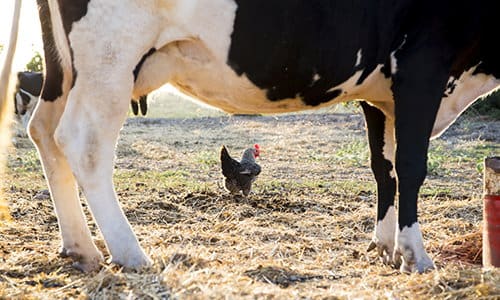
The pigs and chickens get unlimited forage, which makes up a good chunk of their diet. They are also fed with grown fruits and vegetables. This gives them a good variety of flavors and micronutrients necessary to thrive. The base of their “grain” food is quinoa and lentils, which are grown on the homestead as well. We chose quinoa and lentils over corn and soy because of the health benefits for the animals and those who consume the meat and eggs!
The rabbits are like mini cattle and they are forage-fed on pasture to their content. They also get plenty of snacks from the garden as well.
The only thing that I don’t produce for my animals on the homestead is their minerals. We still buy those and don’t see a way out of that.
Fresh Food
While the warmer seasons surely offer better food production in the garden, I still have plenty of crops that I grow in winter, including: carrots, potatoes, radishes, turnips, beets, kohlrabi, rutabaga, broccoli, Brussels sprouts, onions, peas.
If I put up a greenhouse I can expand the winter growing potential even more. The reason I haven’t is that I get plenty from the garden in the winter and store a ton of food from the warmer months, meaning I don’t need to grow more.
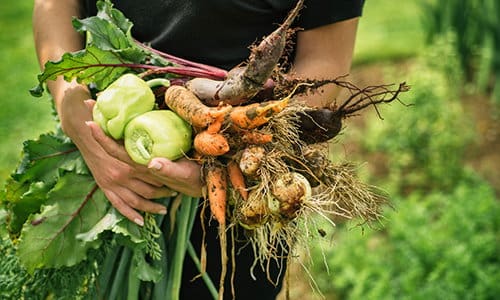
Stored Food
The warm seasons produce an abundance of food, which our family works hard to preserve to make it through the scarcer winters. We store:
- Vegetables from the garden, and fruits from the fruit orchard
- Nuts from the nut trees
- Lentils, quinoa
- Herbs and spices
I can produce enough of each of these that I wouldn’t even need to garden in the winter if I didn’t want to!
The key is to develop multiple recipes using what you can grow and plot out how much of each ingredient you’d need to make it through a whole year!
For example, I have our family on a 28-day schedule of dinners that utilize all the foods we produce on the homestead, and that gives me exactly how much I need to make it through a whole year since we’d make each recipe 13 times.
Success in homesteading is all about planning!
Related: 8 Dangerous Mistakes To Avoid When Storing Your Food
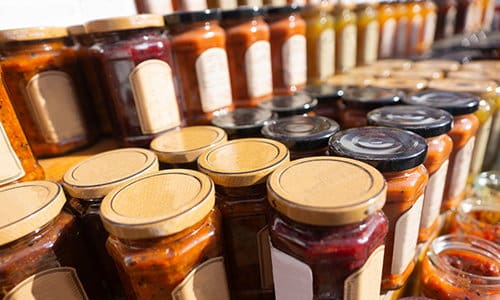
Household Goods
There are things that we use at the homestead that can be bought at the supermarket. Instead, we purchase those online and typically choose zero-waste/eco-friendly alternatives since that is a focus of our way of life.
I won’t give you a list of what we use, but I assure you it is less than the typical household. We are homesteaders and eco-conscious consumers, but that’s not all. We are also minimalists, meaning a lot of the consumer goods that people buy simply aren’t necessary for us!
This makes it easy to make 1-2 online orders during the winter instead of going to the local supermarket. If we ever reach the point of full self-sufficiency, even this might become a thing of the past. But, we aren’t there yet and may never be.
Homesteading isn’t about perfection or reaching 100% self-sufficiency. It’s about getting better every day and knowing exactly where your food comes from! Avoiding the supermarket is simply a fun game that we can play in this day in age and it’s also good practice in the event of a disaster that shuts down all commerce.

Could You Survive A Winter Without The Market?
We didn’t get to this place overnight, but we did make the trip towards self-sufficient homesteading rapidly.
However, you can simply grow and garden and get a few chickens and see how many meals you can make without needing to go to the grocery store. If you like the challenge, you can expand your homestead and see how much longer you can go.
Making it through the winter can be tough, but anyone can do it if they plan accordingly!
You may also like:
 Are You A Community Member Or A Lone Wolf?
Are You A Community Member Or A Lone Wolf?
New Invention 12X More Efficient Than Solar Panels (Video)
The Ultimate Guide To Composting
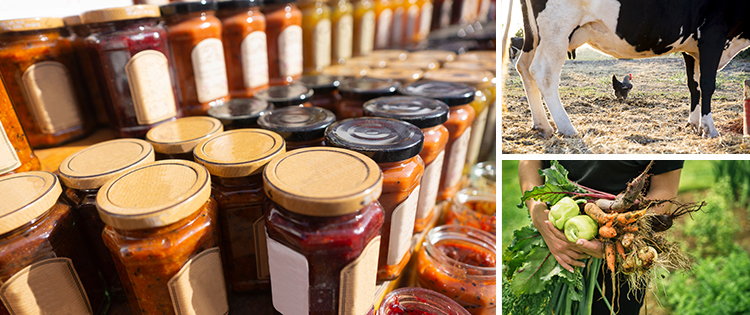

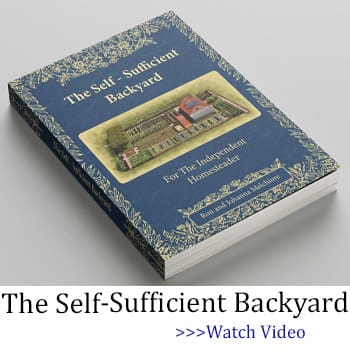


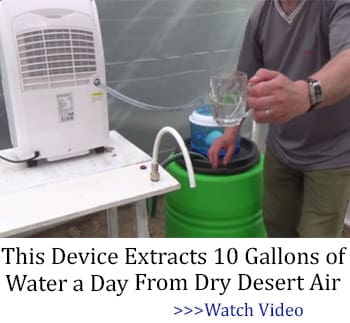

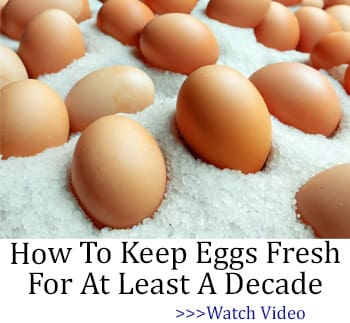

I’m curious what are your recipes that you use on rotation regularly every month?
But how would this be possible when I live in Zone 4a?? We have a 90 day growing window that sometimes is shortened even further by early/late frost and snow (I have seen it snow on June 22nd here)? I grow and preserve quite a lot of food during the summer. I use covers over my raised beds to protect from early frosts and that can help prolong things. I don’t have enough acreage to grow enough grains for our family or raise much more than some chickens which we do have. We are building a greenhouse/sunroom on the back of our home (which faces directly south) and we plan for that to provide for some winter growing but it certainly isn’t enough space for all of the needs for 6 people!! We also have very high ground water and having a root cellar or underground greenhouse is impossible. Our yard is often spongy in the summer from the height of the ground water.
These are just some of the challenges we face in becoming self-sufficient. It feels like we will never achieve it.